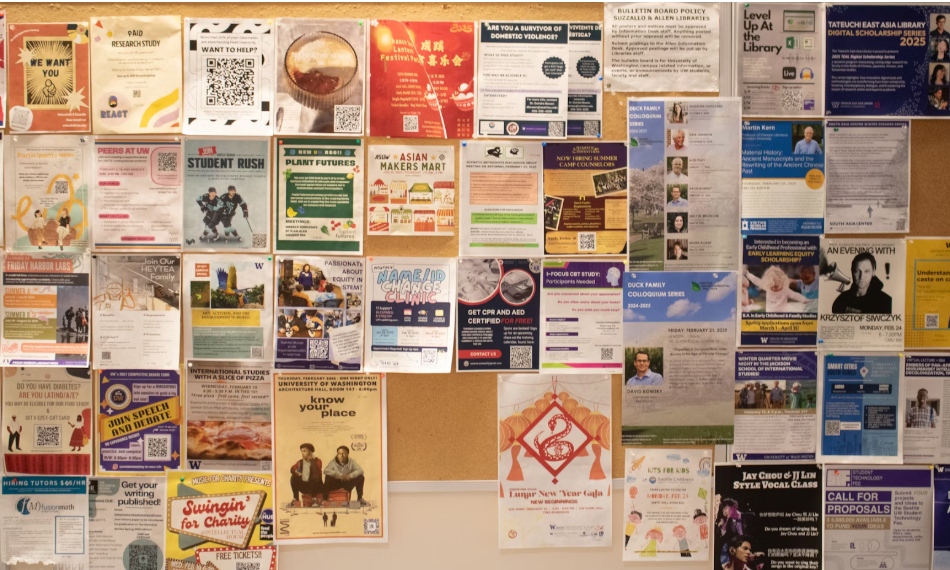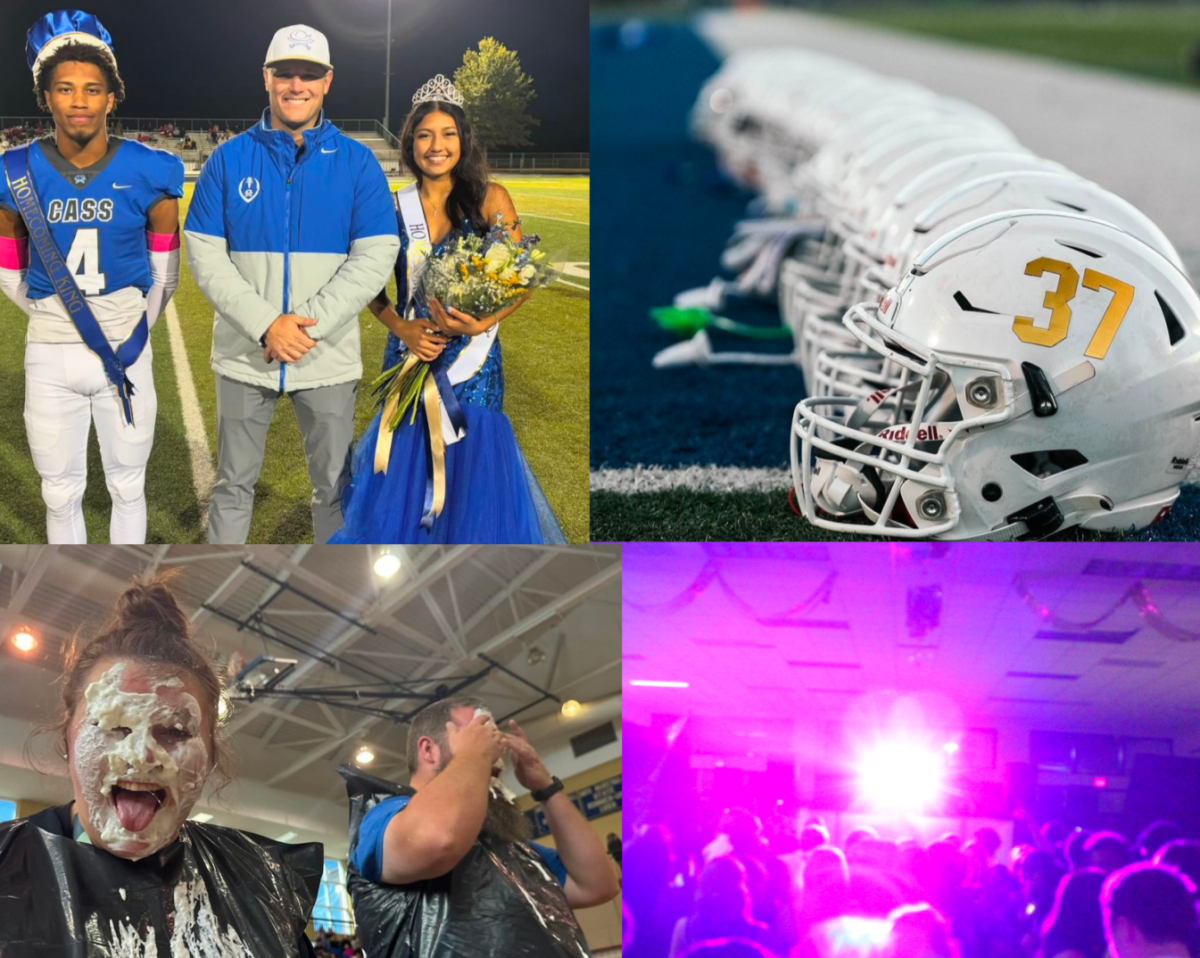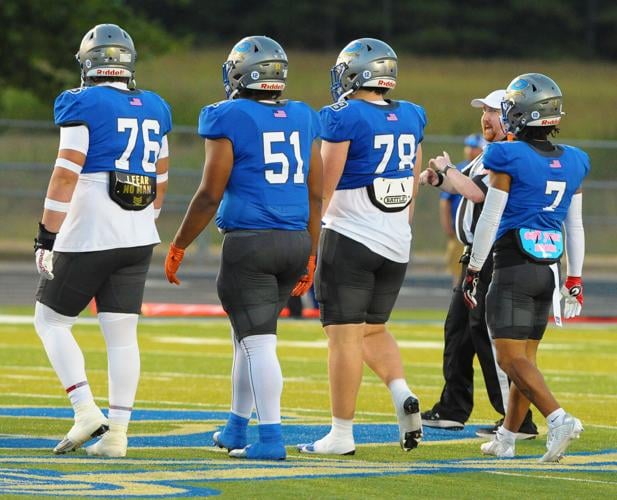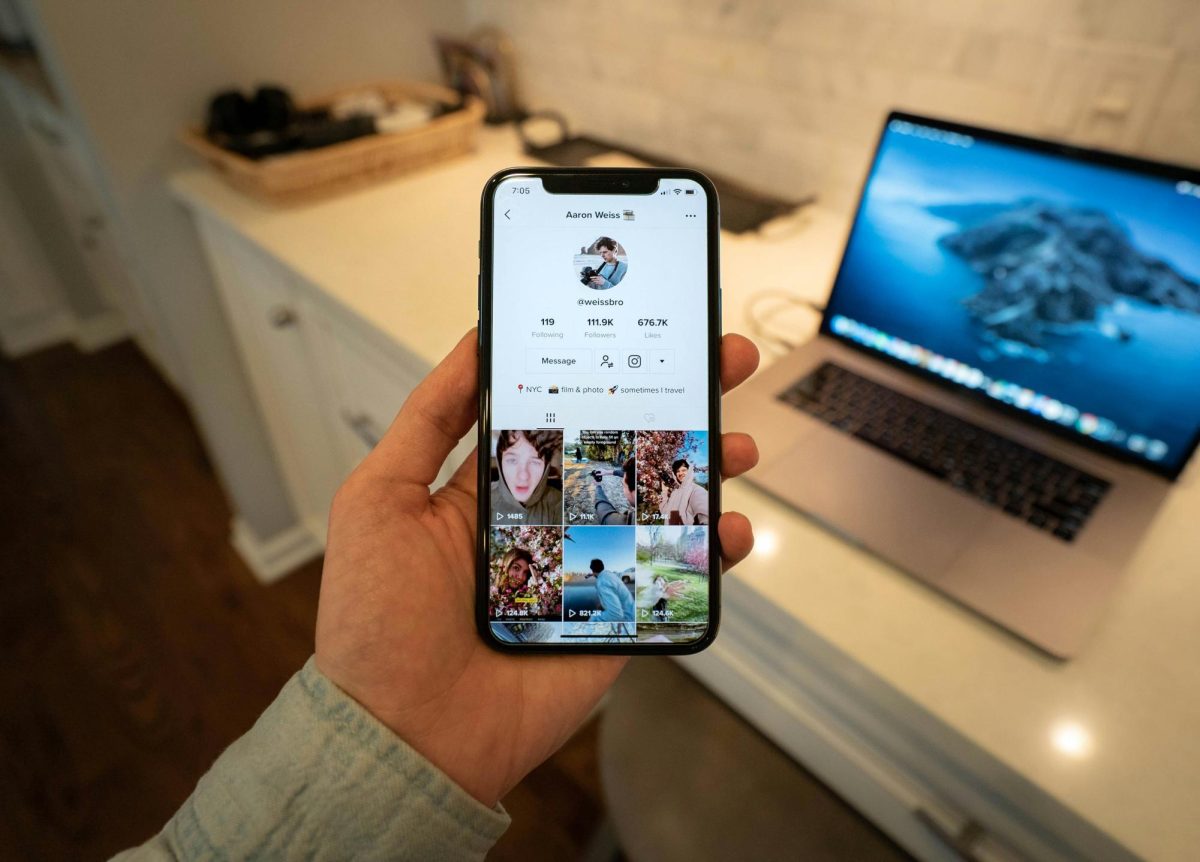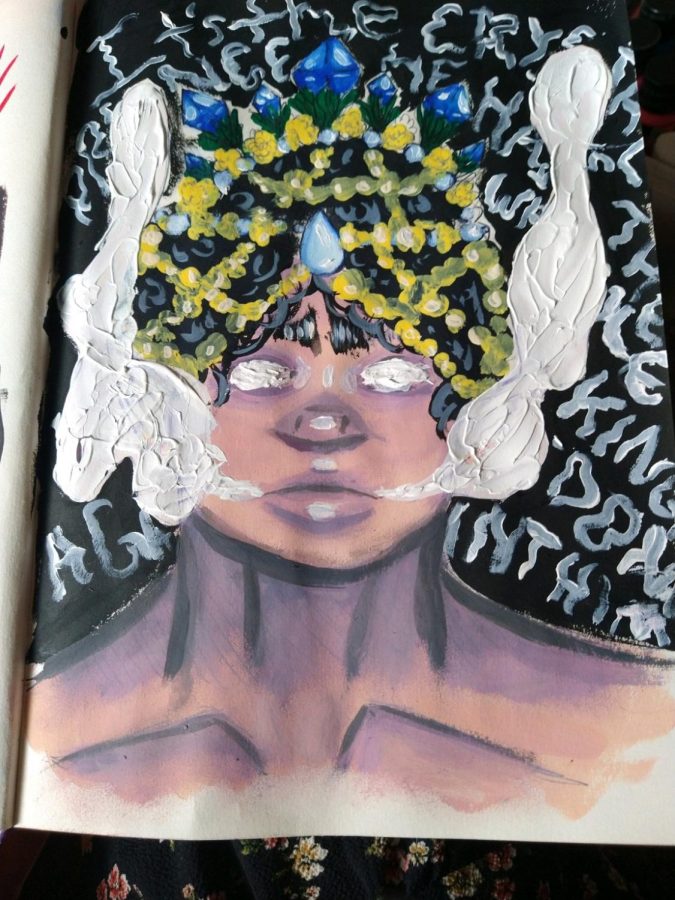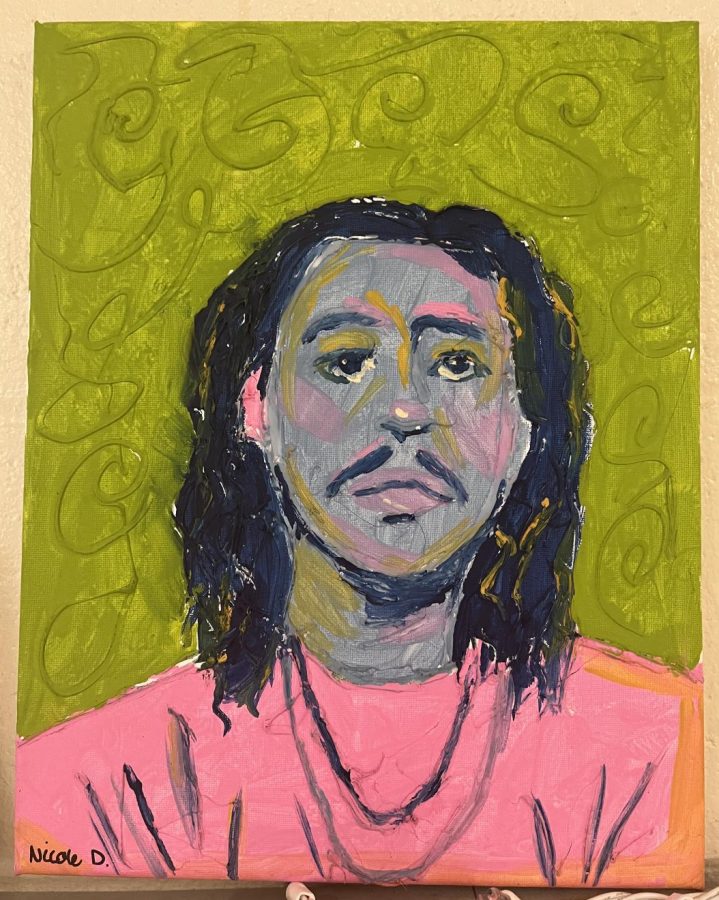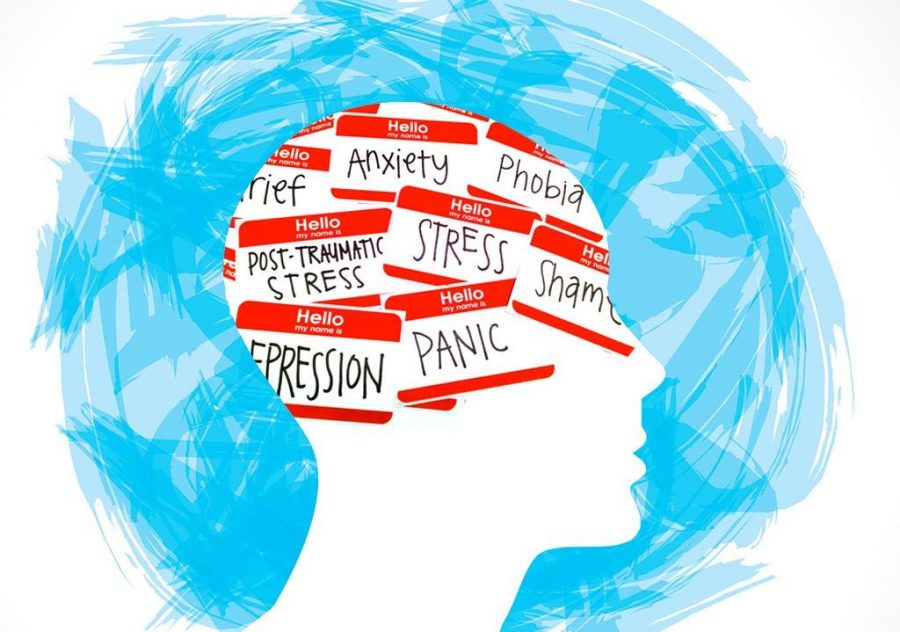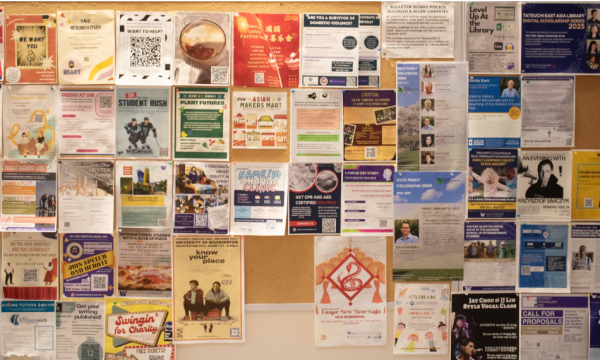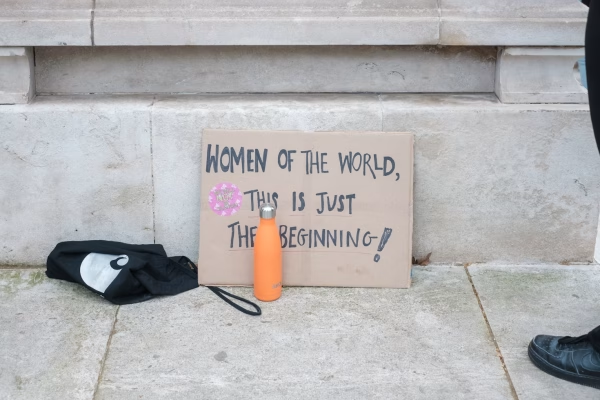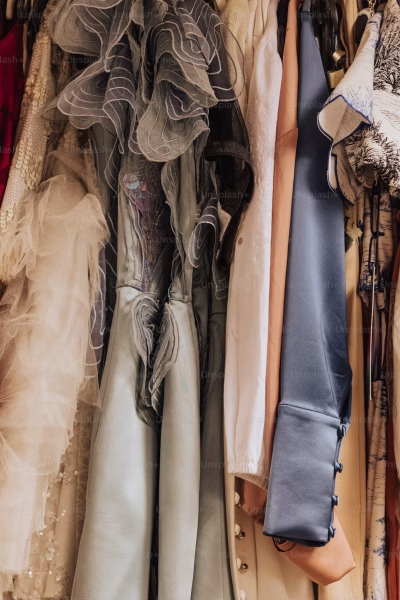The Face of Mental Illness
**Trigger Warning: This article talks about many students’ stories behind their mental health and includes potentially distressing material. Please proceed with caution.**
In March of 2019, I knew something was wrong. Doctors initially couldn’t determine what exactly I had. However, after EEGs, MRIs, CAT scans, blood tests, and more, I finally have a name for it. I was diagnosed with anxiety, and as a result of ignoring it so much, it manifested into nonepileptic seizures and tics.
But this isn’t my story. Not by any means. So many people at Cass—from freshmen to seniors—have similar experiences. So many of us struggle daily, both out in the open and behind closed doors. This isn’t my story, but it’s the story of us, as a student body. A story of the strength of a generation. A story of multiple battles—some longer and more ruthless than others. It’s a story of pain, and suffering, and terror, and fear. But most of all, it’s a story of beauty.
Parker*: Senior
Upon entering middle school, Parker began getting into social media and noticing boys, like many other young girls do. However, as a result of her acne, she felt uncomfortable in her own skin. On top of that, she grew up in a predominantly white school, and being a different race made her feel like she stuck out even more. As time progressed, she saw several couples getting together, but she was still single. She began asking herself why she wasn’t being flirted with and why boys didn’t notice her like they did other girls. “I came to the conclusion that I was just ugly,” Parker says. “I would always look at myself and pick out my flaws, and one day, I focused on my weight.”
Parker was never overweight; she simply had the natural fat that everyone has. However, the girl she saw in the mirror was much different. “I started eating less, snacking throughout the day so that I wouldn’t eat large meals. […] My mom had a scale in her bathroom, and when she wasn’t home, I would go weigh myself. I would make sure I haven’t put on weight, and if I did, I wouldn’t eat dinner. If the scale said that I lost weight, it made me happy. I kept eating less and less because I kept seeing results, but sometimes I’d get so hungry that I’d wake up in the middle of the night and just binge on chips, Slim Jims, fruit roll-ups, and all the junk food you can imagine. It was a constant cycle of eating less and less until I was starving, and then binging until my stomach hurt.” At school, everyone told her how skinny she looked, but she still didn’t feel good enough. She believed the only way she would be beautiful was if she was skinny. “With anorexia, you don’t see how skinny you actually get. You just see imperfections that aren’t really there.”
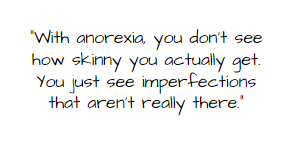 Around the end of her freshman year, things started to change. At school, she would see so many beautiful, curvy girls, and her idea of beauty shifted. She saw how thin she looked, and she began making an effort to gain more weight. “Once I hit the 100-pound mark, I cried. I actually cried.”
Around the end of her freshman year, things started to change. At school, she would see so many beautiful, curvy girls, and her idea of beauty shifted. She saw how thin she looked, and she began making an effort to gain more weight. “Once I hit the 100-pound mark, I cried. I actually cried.”
Eating disorders are one of the most misrepresented mental illnesses in the media, and this only makes victims feel worse. The media tends to only show extreme situations and very malnourished people as poster children for anorexia. “I feel like because of how the media portrays it, people only see the people who are bone thin as anorexic,” Parker states. “They look at a person who is thin and think they are fine just because they aren’t skin and bones. People need to be taught about the tendencies of someone suffering from an eating disorder, not how they look. I’m a classic example of no one noticing that anything was wrong when there was something very wrong.”
Parker believes the best way to prevent eating disorders is to simply be nice to each other. “[We don’t need to] comment on each other’s weight, looks, etc. We need to build each other up. […] Eating disorders stem from bad personal body image. If we were surrounded by positivity and everyone had knowledge about eating disorders, I think we could prevent more teens from going through what I did, and others would notice the signs quicker so that teens that are going through an eating disorder don’t get so far gone.” She also believes everyone needs to know what is healthy for our bodies. By knowing what is healthy, it can prevent someone from abusing dieting or from excessively exercising.
Nowadays, Parker is doing much better. She is eating more regularly, and even though she isn’t perfect, she’s aware of her actions. “I still catch myself doing things that I did when I was anorexic, but I put a stop to them. I wouldn’t say that I’m completely okay yet because of certain eating tendencies and body image issues, but I’m far into my recovery journey.”
Skylar*: Senior
Skylar was diagnosed with depression and anxiety, and he believes he also likely suffers from social anxiety and attention-deficit disorder (ADD). It didn’t come as a surprise to him, as these illnesses were hereditary. However, after losing his father to suicide when he was twelve years old, the trauma caused them to worsen. Although he knew about it beforehand, he was officially diagnosed by a psychologist last year.
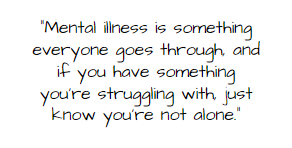 With many mental illnesses, it can be hard to function and regulate emotions. “For my depression, it’s just not feeling great all the time. I’ll have mood drops [and will feel] unmotivated to do things,” Skylar states. “My anxiety: I overstress and overthink a bunch; my social anxiety: I’m super nervous to meet new people and be at social engagements. [With] my ADD, I’ll start a million projects, but won’t finish many, and I’ll get distracted and drift off a bunch into thought.”
With many mental illnesses, it can be hard to function and regulate emotions. “For my depression, it’s just not feeling great all the time. I’ll have mood drops [and will feel] unmotivated to do things,” Skylar states. “My anxiety: I overstress and overthink a bunch; my social anxiety: I’m super nervous to meet new people and be at social engagements. [With] my ADD, I’ll start a million projects, but won’t finish many, and I’ll get distracted and drift off a bunch into thought.”
Luckily, his support system has bettered over time. “My family went through it all, and we all have our own issues,” Skylar recalls. “For a while, it was kind of rough, and we didn’t [support each other], but in the recent year, we’ve been really good. I’ve always had friends though that have helped me, and I can’t be more thankful for them.”
He also believes people should be more open about mental illnesses in general. “I think just the act of speaking out about it is fantastic. Just showing that regular, everyday people suffer from all sorts of mental illnesses is a great start to raise awareness and let people know they’re not alone. We have to kill this stigma that mental illness is something that shouldn’t be talked about because it’s a part of our everyday life, and if we talk about it every day, it’ll be easier for other people to accept what they’re struggling with. Mental illness is something everyone goes through, and if you have something you’re struggling with, just know you’re not alone.”
Alex*: Junior
Alex’s anxiety has impacted every aspect of her life—everything from her relationships to her school life. In middle school, she was heavily bullied about her appearance and the little things she would do, and her anxiety only made her believe the lies even more. “It was hard to love myself after that, so recovering from that was a long process, but my anxiety just made things worse. I constantly thought that everyone hated me after middle school, even if they didn’t.”
Coming from middle school, her grades also were relatively average. However, the pressure and unwanted thoughts made her believe that she wasn’t good enough. As a result, she started improving her grades. Yet, this quickly became her downfall. “I started becoming a perfectionist, and my grades [were] my life. During tests, my heart would race so fast. I don’t even know how many times I had mental breakdowns because I was constantly stressed about not being good enough or failing. Anytime I made less than a 100, I would cry.”
 She isn’t the only one with severe test anxiety. After all, the American Test Anxiety Association claims that severe test anxiety could affect as much as 20% of the school-going population. However, Alex’s anxiety wasn’t just focused on tests, so it was easier for her to slip. “It was so bad [that] I let it take over my life,” she says. “It caused me to go into a deep depression and battle with myself that affected a lot of my relationships with other people.”
She isn’t the only one with severe test anxiety. After all, the American Test Anxiety Association claims that severe test anxiety could affect as much as 20% of the school-going population. However, Alex’s anxiety wasn’t just focused on tests, so it was easier for her to slip. “It was so bad [that] I let it take over my life,” she says. “It caused me to go into a deep depression and battle with myself that affected a lot of my relationships with other people.”
Her anxiety has also been a leading factor in her decision to hold off on driving. “I’m not confident in putting other people’s lives—including my own—at risk. Sure, I get made fun of for it sometimes, but it’s something I’m genuinely terrified of. It sucks that I’ve gone so many years losing that teenage driving experience.” She especially hates having to ask for rides whenever her friends want to get together and hang out. However, she decided that it is better than letting her anxiety control her behind the wheel.
For her, her symptoms consist of mainly fidgeting and heavy breathing, as well as anxiety attacks. She also tends to overthink and cry a lot, and she will often feel her heart race.
Her loved ones always try to support her as best as they can. “Although some may not understand completely, I know they try their hardest to.” She has been able to rely on her friends’ and family’s love and support throughout the years to help get her through the tough times.
Nowadays, Alex uses relaxing music and breathing techniques to calm her down. Other times, she simply puts her head down or cries it out. “I do believe it’s made me stronger, and I’ve definitely learned to deal with it in a healthier way as the years go on.”
“[Mental illness] is different for everyone,” Alex states. “Not everyone struggles the same way, nor do they cope the same way. But I also want people to know that they’re not alone.”
Nicole*: Senior
For Nicole, her battle with Borderline Personality Disorder (BPD) began developing when she learned of her dad’s illness. At the end of fourth grade on her birthday, she was called to the office. She was told her dad was diagnosed with stage four lung cancer. For three years, she went to each appointment, each chemotherapy session, and each step of the way. However, it wasn’t enough. Halfway through middle school, he passed away.
The loss of her father was a catalyst for her BPD. “During that time, I was beyond depressed,” Nicole states. “I would go through manic and panic episodes. It was really hard considering he was the only one I talked to about my feelings.” Therapy didn’t work for her, and she didn’t know how to handle her emotions. As a result, she did what every other teenager does—she bottled them up.
In sophomore year, Nicole watched as her younger sister was struggling with her dad. Nicole took it upon herself to help her sister and tried to be there for her, just as she did with her own father. Meanwhile, she was also going through a breakup of a three-year relationship. “No one was there for her, so I talked to her,” Nicole says. “Doing that was when I realized I need to talk to someone as well. So long story short, I went through a few sessions with a therapist, psychiatrist, family doctor, and some scans on my brain. I got diagnosed with BPD at the end of sophomore year.”
BPD is one of the mental illnesses that is not commonly mentioned, and many people know very little about it. It is often misdiagnosed or grouped into anxiety, depression, or bipolar disorder. “BPD is different from all of those,” Nicole states. “I have this constant fear that no matter what I do, someone will leave, whether it be a friend or a family member. They could leave from death, me being rude, anything. This often leads to me pushing people away and not interacting with them so I don’t screw up and say something to hurt them. [For me, BPD consists of] severe mood swings, constant separation anxiety, and black-and-white thinking.” For her, she also finds that her mental illness causes her to overthink and overreact. This makes it harder for her to regulate her emotions. “Each day, I have to try my hardest to react ‘normally’ to things and to control my emotions.”
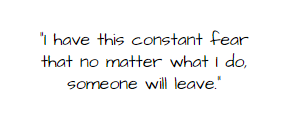 Luckily, Nicole has had so much support in her journey. Although her mother didn’t initially believe her and assumed that she was faking it, her younger sister completely supported her. Her paternal side, however, understood depression after Nicole’s father died, so it was easier for them to come to terms with her BPD. Regardless of her mother’s side not understanding, they still tried to help her. “They always try to comfort me and talk stuff out with me.” However, Nicole found that her friends were the most helpful. “Friends have been the most supportive thing through all of this. They stayed with me these last five years without him and the last year-and-a-half with me figuring out all of this.”
Luckily, Nicole has had so much support in her journey. Although her mother didn’t initially believe her and assumed that she was faking it, her younger sister completely supported her. Her paternal side, however, understood depression after Nicole’s father died, so it was easier for them to come to terms with her BPD. Regardless of her mother’s side not understanding, they still tried to help her. “They always try to comfort me and talk stuff out with me.” However, Nicole found that her friends were the most helpful. “Friends have been the most supportive thing through all of this. They stayed with me these last five years without him and the last year-and-a-half with me figuring out all of this.”
When she was first diagnosed, she tried to look online for articles and interviews regarding people with the same mental illness as her. She was hoping for a way to see how BPD would shape her as she grew older and to look for advice to help her along the way. What she wasn’t prepared for was the countless articles that were about how BPD wasn’t real or how it was just another word for anxiety and depression. She hopes that if more people talk about mental illnesses (especially when it isn’t spoken about in a negative light), more people can understand how serious it can be and will be able to get help themselves.
Nicole wants people to know that BPD may not be easy to deal with, but with people there for her, it has made her journey much easier. “BPD makes me scared to lose anyone and makes it seem like if anyone knew I had this, they would hate me. But it’s honestly done the opposite. It’s opened so many doors for mental health discussions with my family and friends. It’s led to some of them seeking therapy and help too, as well as strengthening our personal relationships.”
Scott*: Senior
Scott developed anxiety when he first discovered he was gay. Growing up in a Muslim family, this was not widely accepted, and he struggled to balance both. “I believe everyone has a hate in me for liking someone of the same gender. I still have that feeling up to this day.”
 His anxiety especially skyrockets whenever a taller or stronger male is near him. “My anxiety sparks up when there are dominant or tall men near me, but the same time, I want a stronger person near me.” Unfortunately, this is due to being sexually harassed and assaulted by a previous partner.
His anxiety especially skyrockets whenever a taller or stronger male is near him. “My anxiety sparks up when there are dominant or tall men near me, but the same time, I want a stronger person near me.” Unfortunately, this is due to being sexually harassed and assaulted by a previous partner.
On top of this, his family is not very supportive. “My family is obviously Muslim, and they believe that mental illness is fake. So when I have therapy and […] take medicine, my family thinks I’m insane.” However, it’s been a few years, and Scott has already come to terms with it. Unlike his family, his friends are much more supportive. “My friends are more aware of me because not only [do] I have bad anxiety, I have insomnia and asthma. My friends are cautious of the things I do, and I appreciate it.”
Scott believes asking questions will help spread awareness. “You could see and ask someone how are they doing or ask if their life is moving positively,” he says. By checking up on your friends, family, coworkers, and classmates, we can help them feel supported and loved.
Jessica*: Sophomore
For Jessica, mental illness ran in the family. Her mother had depressive disorder, and her father had anger issues and anxiety. Jessica inherited both. Like her parents, she has mild depressive disorder and social anxiety. She discovered this from an early age, and her parents made sure it wasn’t on her medical record, as they didn’t want it to be the first thing her future employers saw.
Because her anxiety occurs mainly in social situations, Jessica can never be out for too long in public. “[My anxiety is] definitely most present when I am around groups of people—friends or not is regardless. At first, I’m me, and then as the hours go by, I get more and more fidgety, less talkative, and I look/feel physically drained. Usually, I start to actually feel sick to my stomach if I stay out too long.” Luckily, the people in her life are supportive, but there isn’t much they can do to help. “My friends know and understand to a point,” Jessica states, “but there’s nothing anyone can do except to leave me be. Once I’m drained, I usually take a few days off from seeing people until I feel like myself again.”
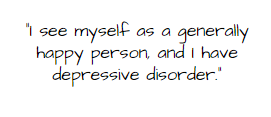 Jessica doesn’t take medication for her anxiety or depression (as her parents work in the scientific field and don’t trust medicines). Due to this, she’s learned to cope with it using other methods. “I have a few tricks I used, like the counting method (how many red things are in the room, how many square things, etc.), and I wear a bracelet to fidget with when I am twitching.” She isn’t sure if she’ll take medications when she’s older though.
Jessica doesn’t take medication for her anxiety or depression (as her parents work in the scientific field and don’t trust medicines). Due to this, she’s learned to cope with it using other methods. “I have a few tricks I used, like the counting method (how many red things are in the room, how many square things, etc.), and I wear a bracelet to fidget with when I am twitching.” She isn’t sure if she’ll take medications when she’s older though.
She believes that because mental illness needs to be discussed by people suffering from them in order to help teens overcome it. “A person with an actual diagnosis needs to be given a platform (instead of just social media) to talk about it because what happens is a healthy individual posts “raise awareness” on Insta[gram], and then, it goes nowhere. Not just the mainstream diagnosis either; I’m talking people with OCD or any of those more serious illnesses.”
Jessica wants people to know that “it isn’t people saying, ‘I’m depressed’ or ‘I’m scared.’ It is an actual medically wrong thing in the brain that affects actions and decision-making. I see myself as a generally happy person, and I have depressive disorder, but that doesn’t mean I go around parading it like it’s a trendy thing. The more people who say they have it and don’t, the more steps backward we take to an actual understanding of it.”
Morgan*: Senior
Morgan doesn’t know exactly when his panic disorder developed. It started out as small episodes that he took as asthma attacks, as he’d been suffering from asthma since he was young. However, this past August, he discovered it developed into something different. The episode he had was treated like an asthma attack, but he found that his symptoms were unlike his previous ones. Everyone knew that he was acting differently, so they took him to the doctor, where he was diagnosed with a panic disorder.
The doctors gave him a very high prescription off the bat, one that had detrimental effects on his body. “The medication I was put on at the start to ‘help’ actually made things worse,” Morgan says. The medicine caused him to develop tics and other muscle issues. “After getting pulled off the medication, I never got placed on a new one, so I still have some of those symptoms.” However, having no medication has helped him become more aware of himself. “Over time, I learned some signs that I’ll start doing, which signifies an episode is about to take place, yet I keep fighting them and try to go forth with my day because I feel like I ain’t seen as normal, although sometimes, that leads to [panic] attacks happening in random times at random places.”
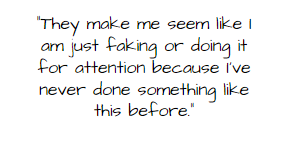 Many people are supportive of his panic disorder. During these panic attacks, his friends will sit with him and try to calm him down.
Many people are supportive of his panic disorder. During these panic attacks, his friends will sit with him and try to calm him down.
Like many others, Morgan believes that social media plays a large part in affected mental health. “Social media is probably my biggest problem, since most people don’t understand or care. […] They make me seem like I am just faking or doing it for attention because I’ve never done something like this before, which just put me down because I can’t exactly control this.” Many teens believe social media has had a negative effect on their mental health. According to a study by John Hopkins University Bloomberg School of Public Health, young people that spend more than three hours on social media daily are more likely to develop depression, anxiety, and other illnesses.
He thinks that one way to spread awareness on mental health is to look at the parents, who he believes are partially responsible for the stigma. “I think it might fall back onto the parents on how the children are raised to treat others. […] Everyone seems to make the situation worse just because they say something without finding out the truth.” If people were raised with the knowledge of being kind to one another, it would make things easier for people to speak out. “I would [also] say that they should ask questions. If they know someone has a mental illness or are curious about the mental illness, they should just ask about it because […] we all have a different branch of it, which influences how we function.”
Edith*: Senior
Edith never had the typical, happy childhood. She lived with her grandmother and would constantly take trips to visit her mom, who never really had her life together. She didn’t have friends growing up, and going into elementary school, she didn’t know how to socialize or behave in a classroom (her first friend wasn’t made until first grade). On top of that, her siblings were split up and were all raised in drastically different ways, which caused tons of stress in the family.
However, it seemed she jumped out of the frying pan and into the fire when she entered high school. In ninth grade, her mom had just gotten married, and it wasn’t going well for the family. Edith hadn’t eaten in a couple days, and when she realized it, she wanted to keep going, since she wanted to be thin. “For almost the entirety of ninth grade, I limited calories and got pretty skinny,” Edith states. “I knew what I was doing though and that it was bad, and I was open about it.” Many of her friends were nervous for her, and eventually, she overcame it.
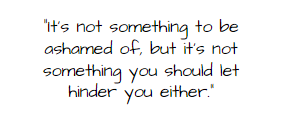 Yet, it didn’t end there. After her mom had gotten married, her family let a friend of her new stepdad live with them. Edith got bad vibes from the man though, and although she tried to tell her family members, they wouldn’t believe her. “No one would listen to me when I was telling them he was a creep. He would always get mad at me, and call me a brat, and just be so mean to me because I wouldn’t let him near me.” Unfortunately, the worst had yet to come. “One night, he had crept up on me and my stepsister in the living room, thinking we were asleep, which I thought was weird. […] It came out later that he had been assaulting my stepsister for months when no one was home. He was just a really bad guy that did really bad things.” On top of that, she also had several other incidents with her family members, but the straw that broke the camel’s back was watching her dog die in her arms.
Yet, it didn’t end there. After her mom had gotten married, her family let a friend of her new stepdad live with them. Edith got bad vibes from the man though, and although she tried to tell her family members, they wouldn’t believe her. “No one would listen to me when I was telling them he was a creep. He would always get mad at me, and call me a brat, and just be so mean to me because I wouldn’t let him near me.” Unfortunately, the worst had yet to come. “One night, he had crept up on me and my stepsister in the living room, thinking we were asleep, which I thought was weird. […] It came out later that he had been assaulting my stepsister for months when no one was home. He was just a really bad guy that did really bad things.” On top of that, she also had several other incidents with her family members, but the straw that broke the camel’s back was watching her dog die in her arms.
Each situation contributed to her mental illnesses. Today, she is diagnosed with depression, anxiety, and minor Post-Traumatic Stress Disorder (PTSD).
Many of her friends and family are supportive of her mental illnesses, save her grandmother, who laughed at the mention of PTSD. Edith also takes medicine for her mental illnesses, but she doesn’t like swallowing pills. As a result, she introduced herself to several different coping mechanisms to help her through these tough times so that she doesn’t have to rely on medications. She found that Disney movies and her pets have been the best stress relievers for her. “I know myself and what I need, so it’s easy to keep it under wraps.”
She believes the best way to help the younger generations is to get the point across to the older generations, many of whom are responsible for the stigma around mental illness. “It should probably be geared more towards them,” Edith says. “Besides, if we’re at their mercy, there’s not much [we] can do if no one will listen.”
Her advice to people suffering from several mental illnesses is to focus on helping yourself and keeping up with the need for normalcy. “I can function normally, but when I have bad days, […] what I’ll do is make it a point to laugh, and make jokes, and just have a good time with friends while we are in school because it really does help.” She also says, “It’s not something to be ashamed of, but it’s not something you should let hinder you either, if you can help it.”
Scarlet*: Senior
At the end of middle school, Scarlet became friends with Corinne*, a girl who soon become Scarlet’s best friend. Their relationship had several ups and downs. However, they bonded over their broken homes. “My dad moved away,” Scarlet recalls. “I had a single mom who worked most of the time, so sometimes I was home alone, and I really didn’t have my mother figure in the week. […] My dad was obviously gone, so I didn’t have my dad figure. I kind of grew away from my family.” With Scarlet’s parents having separated, Corrine became her new family.
However, little did Scarlet know that their relationship would soon turn sour. “We used to hang out all the time, and she would tell me that I was super pretty, but whenever other people were around, it was like I was super ugly. Whenever she felt threatened, it was like I wasn’t good enough.” Scarlet, who has had severe anxiety since she was in elementary school, would often be swayed by the things Corinne would tell her. “She used to tell me all the time that maybe I should stop eating because maybe then I’d be prettier and that people would want me.”
Corinne’s words only got to her more and more over the years. “Whenever you have a friend that you trust a lot and they tell you, ‘Maybe you should stop eating,’ or ‘Maybe you should wear more makeup,’ or ‘Maybe you should change your clothes,’ you trust that they’re telling you the truth because they love you and they care about you. For a while, I believed everything she said. If you look at my pictures from my freshman year to now, you can see a huge difference. I distinctly remember taking this one picture, and you could literally see the divots in my collarbones. I wasn’t okay, at all. What really hurt is that I was getting compliments off of how good I looked, but I hadn’t eaten in days. That hurts, and that’s hard.” This caused her to have a negative outlook on her body, which affects her even to this day. “This morning, I could put something on, and I’ll be like, ‘Why am I so ugly?’ […] I feel like my body is just ugly.”
 Meanwhile, Scarlet was still in the closet at this time, and this added a lot more anxiety. “I was stuck in between—I didn’t know what I liked. I didn’t know my preference when it came to who I liked and what I liked. That added a lot of stress.” Eventually, she told her loved ones, including Corinne, who she always told everything to. “Once I had came out to my friends and family, our relationship got a little rocky,” Scarlet says. “It was a little weird, which obviously caused me to stress out. I felt like I was losing my friend, and the more that she got involved in her boyfriend and growing up, and I got involved in my life and growing up, we found that, each other, we grew together and that it made our friendship stronger. But it only lasted so long. Once she found her new friends that would do drugs with her, she kind of ditched me, which kind of hurt me feelings because it felt like I had lost my best friend.”
Meanwhile, Scarlet was still in the closet at this time, and this added a lot more anxiety. “I was stuck in between—I didn’t know what I liked. I didn’t know my preference when it came to who I liked and what I liked. That added a lot of stress.” Eventually, she told her loved ones, including Corinne, who she always told everything to. “Once I had came out to my friends and family, our relationship got a little rocky,” Scarlet says. “It was a little weird, which obviously caused me to stress out. I felt like I was losing my friend, and the more that she got involved in her boyfriend and growing up, and I got involved in my life and growing up, we found that, each other, we grew together and that it made our friendship stronger. But it only lasted so long. Once she found her new friends that would do drugs with her, she kind of ditched me, which kind of hurt me feelings because it felt like I had lost my best friend.”
In junior year, Scarlet was knee-deep in stress. Between AP classes, SAT and ACT tests, and pressure from colleges, her anxiety only got more severe. It caused overwhelming thoughts that made her truly believe she wouldn’t get into college. On top of that, her grades from sophomore year weren’t what she wanted them to be, and that only made her anxiety worse. “During my friendship that I had before, my grades had actually slipped a lot, and I messed up really bad. I thought that I was going to miss out on opportunities, so that really stressed me out when it came to comparing myself to my classmates.” Her grades from sophomore year also weren’t high enough for her dream college. “I prioritized having my toxic friendship over my grades, and it ruined me wanting to go to my dream school.” This only made her anxiety and self-deprecating thoughts worse. Nothing she could do could allow her to escape. “I had this weight that I carried on my shoulders that I was going to be screwed and that I had to take every single AP class to get into college.” As a result, her anxiety got the best of her. She signed up for and completed as many AP classes as she possibly could fit in her schedule.
Scarlet’s anxiety causes her to stress and overthink. It also causes her to have what she calls “episodes,” where she is “driven insane” by her overwhelming thoughts. When she has these episodes, she will be short of her breath, cry, and scream. She will also shake, and her body will get cold. “I can’t get out of my own head.” The anxiety also puts stress on her current relationship. She will confront her girlfriend, claiming that she is cheating on her, since she overthinks situations so much that she believes them. “It’s ruined my friendships with people; it takes a toll on my relationship, and it does on my health too because I feel like everything I do is wrong, and it’s going to be wrong until I can fix it, but what if I can’t fix it? I carry such a big weight on my shoulders, and it’s stuff that I shouldn’t even be stressed about.” She can never seem to get rid of the thoughts, and she hates when people tell her to “forget it” or “stop stressing about it.” Her anxiety takes such a large toll on her health that, had it not been for her current support system, she may not have gone on much longer. “I never thought that I would live to see my senior year,” Scarlet says. “I thought the end of my life was going to be in my sophomore year. It was relationships, it was my grades, I didn’t feel good enough, I was suffering in band—I wasn’t happy. The hardest thing really was that I would I stopped showing my emotions. I had no emotion. I never cried. I don’t want to say I was mean, but I had really tough skin. […] It wasn’t that I was mean to people; I was mean to myself.”
Luckily, her family and her friends are a much better support system than previously. She no longer goes to therapy now, as she believes she can do a good job handling her anxiety by herself. She tries to hide it at home a little more, as she feels like she “has to be strong for everyone around [her].” However, she feels like she can rely on her friends much more. With Corinne, Scarlet says, “I felt like I was insignificant and I didn’t matter. She didn’t say that, but that’s how I felt. I was telling myself that. I couldn’t stop telling myself that.”
Scarlet uses social media regularly, but she admits that is hasn’t done much to help her over the years. “Social media has done nothing but hurt my self esteem when it comes to body image. I see a lot of pro-eating disorder tips, and I’m like, ‘Oh! I’ll try that.’ And it’s not very healthy at all! I compare myself to everybody, and I’ll see some girl that has a super, super, super skinny waist, but she’s got a big ‘ole booty, and I’m like, ‘Dang…must be nice.’ I feel like I see images of other people, and I have to look like that, and if I don’t look like that, she’s not going to love me. I feel like I can’t be loved if I don’t look like society’s image of beautiful. Everyone tells me I’m beautiful in my own way, but social media really killed my self esteem rather than help it.”
Scarlet wants people to know that mental disorder has many faces. “Mental illness doesn’t have a face, and I feel like people aren’t aware that anybody in any shape, form, color can suffer from mental illness, and it’s not just the people that look like it. […] Anybody can have anything and be captain of the football team or they can be drum major; they can be all of those things and still suffer from [mental illness]. Just because you look okay doesn’t mean you’re okay.”
After hearing these students’ stories, it can be quite eye-opening, to say the least. It reminds me of the cliché phrases you hear about not truly knowing someone until you put yourself in his or her shoes. Most of us don’t realize what’s going on outside of the walls of the average American high school, and you never know what someone has gone through.
When you walk down the hall, you see so many faces, and behind each one is a story. And because you don’t know what that story is, you can’t judge someone by what you see with just your eyes.
The most unfortunate part about this experience has been how excited people were for me to write this, but it’s not for the reason one would think. It’s simply because none of them have ever had the chance to tell their story before.
The support I’ve received over writing this article has been outrageous. Many students firmly believe that mental health is just as important as physical health, and by spreading awareness of the subject matter, they hope other teens will be able to feel supported and get the help they need.
We need to do more to help spread awareness for mental illness—as a school, as a community, and as a generation. These students are just a handful of a much larger population, one that isn’t being represented, and especially not in a positive light.
Mental illness isn’t always easy to spot or easy to resolve. By learning the signs and supporting the sufferer, we can change society—one person at a time.

*Names have been changed to protect these students’ privacy.


